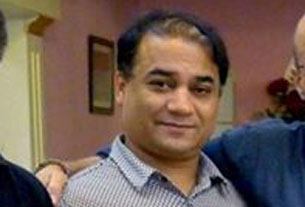
2014-02-28
Chinese authorities have barred detained Uyghur scholar Ilham Tohti's lawyer from meeting with the professor's wife, while it remains unclear whether the government intends to prosecute Tohti for the state security crime of “separatism,” which can result in the death penalty, or for the lesser crime of “inciting separatism,” according to the wife and a human rights group.
More than a month after the detention of the Beijing's Central University for Nationalities professor, police remain on guard outside Tohti's home, preventing anyone from meeting with his wife Guzelnur, including his lawyer, Li Fangping.
"The Beijing police are still outside my door," she told RFA's Uyghur Service. "If someone tries to come and wants to see me, they do not let them in. Yesterday, they didn't let the lawyer Li Fangping and others come in and see me."
Tohti, who has spoken out for greater autonomy for the Xinjiang Uyghur Autonomous Region (XUAR), was dragged away from his home in Beijing by dozens of police on Jan. 15. He was formally arrested on Feb. 20 by the Xinjiang capital Urumqi municipal police department on separatism charges, Guzelnur had said this week after receiving an official police notification.
Li has not been allowed to meet his client although the charges facing Tohti are serious. Rights groups are concerned that he could face torture in custody.
"That Tohti is being held incommunicado in detention while being charged with one of the most serious crimes under Chinese law considerably heightens his risk of being tortured or otherwise ill-treated," U.S.-based Human Rights Watch said in a statement.
"Torture of Uyghur individuals accused of 'separatism' in Xinjiang is endemic, and Tohti had previously pledged that he would never voluntarily sign confessions acknowledging that his positions constituted crimes under Chinese law," the group said.
“Ilham Tohti’s arrest is purely political and he should be released immediately,” said Sophie Richardson, China Director at Human Rights Watch. “He remains at high risk of torture and ill-treatment as long as he is in custody.”
Human Rights Watch said that there is no publicly-available evidence of Tohti having engaged in any form of speech or behavior that could be construed by any objective standard as inciting violence or unlawful action.
Opposed independence or separatism
While outspoken and critical of many policies carried out by the Chinese government in Xinjiang and towards the Uyghur community, Tohti has always clearly stated in his writings and in the interviews he regularly gave to the foreign media that he opposed Uyghur independence or separatism, Human Rights Watch said.
It is not yet clear whether the Xinjiang authorities intend to prosecute Tohti on the state security crime of “separatism” or for the lesser crime of “inciting separatism,” the group said, adding that the former can result in the death penalty, and it is often reserved for cases in which the defendants are suspected of setting up clandestine organizations, such as political parties, or for those suspected of having committed or planning to commit acts of violence.
“Inciting separatism,” which carries penalties ranging from less than five years to 15 years maximum, is overwhelmingly targeted at peaceful dissenters and lawful critics of government policies.
In a worrying precedent, Gheyret Niyaz, the administrator of the website created by Tohti, which focused on Uyghur and Xinjiang issues, was sentenced in July 2010 to 15 years imprisonment on charges of “inciting separatism.” Uyghur Online is hosted overseas but has been attacked following Tohti's arrest and is currently inaccessible.
“The charge against professor Tohti suggests that Beijing's definition of separatism knows no bounds,” said Richardson. “And especially in a country that allows virtually no political rights or peaceful discussion of self-determination, arrests of peaceful critics is an increasingly incendiary tactic.”
Chinese authorities in Xinjiang have also formally arrested three students of Tohti on charges of “splittism” and “revealing state secrets,” while the fate of two other students remains unknown, Guzelnur had said Wednesday.
Authorities informed the families of Perhat Halmurat, Shohret Tursun, and Abdukeyum Ablimit—who have been in custody for more than a month—by telephone on Feb. 24 of the charges against the trio and confirmed that they were placed in facilities in the Xinjiang capital Urumqi, Guzelnur said.
“Perhat and Shohret have been charged with ‘splittism,’ while Abdukeyum was charged with ‘revealing state secrets',” Guzelnur said, citing a conversation she had with Halmurat’s parents.
Phone calls from parents
On Friday, Guzelnur said she received a phone call from the parents of Abdukeyum and Halmurat saying the police had refused to allow them to meet with their sons.
Guzelnur also said that on Friday, officials of the Central University for Nationalities at an internal conference warned of the consequences of speaking to the foreign media.
"I know that it is aimed at me but I don't care about that," she said. "I think I should speak up for my husband. He did not do anything wrong. He spoke up for the Uyghurs and he is good teacher and a good father, and he is my life too."
Reported by Mihray Abdilim for RFA's Uyghur Service. Translated by Mihray Abdilim. Written in English by Parameswaran Ponnudurai.
